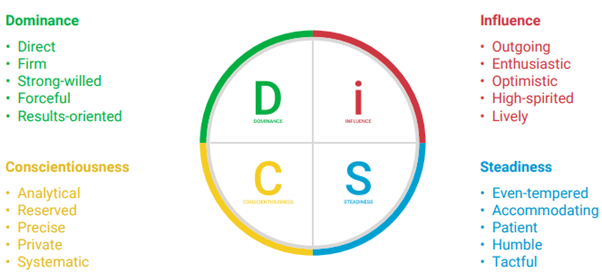The Everything DiSC Si style is the primary amalgamation of Steadiness and Influence traits. A genuine kindness and natural empathy make them relationship builders. Si personality types go the extra mile for others and establish harmony within the team. They reinforce relationships through a gentle care and support for everyone, promoting inclusivity and team spirit.

Si’s kindness and empathy are strengths, but their instinctive preferences can also cause struggles. These include having a hard time saying no, avoiding tough conversations, being overly resistant to change, taking feedback too personally, and overcommitting to social tasks. Si types aren’t intentionally indecisive, passive, or sensitive—these struggles are because they care so much.
Si types value connections above all and long for a consistent, accepting, and harmonious environment. Everything DiSC states that a strong psychological need for a safe and connected space underlies this. Si types’ empathy is excellent at building trust, but passivity, people-pleasing, sensitivity, change resistance, personalizing feedback, and overcommitting can limit their impact. So, it is encouraged that they have self-awareness to balance their approach by integrating assertiveness.
Let’s look at where Si types sometimes struggle, so we can have better insights into working with them and overcoming these challenges.
Struggling to Say No: “I Don’t Want to Disappoint”
Si types take on too much to keep others happy and have a hard time saying no. The need for acceptance from others leads Si types to agree to too many requests, increasing the risk of overload and burnout. An example of this is an Si team member accepting additional work during a busy period, prioritizing the needs of others over self-care. This tendency can help Si types strengthen bonds with others, but it can also lead to them overextending themselves and harming their personal boundaries. Si types can start to develop the ability to refuse requests, for example by saying, “I’m focused elsewhere—can we adjust?” Colleagues can ensure that Si types feel respected by not overloading them with too many requests.

Avoiding Tough Conversations: “I’d Rather Not Confront”
Si types’ aversion to conflict causes them to delay tough conversations and issues in order to preserve relationships. Confrontation is off-putting to Si types, and their need for a peaceful environment makes them avoid directness. An example of this is an Si leader who avoids addressing a team member’s performance issue, maintaining the peace at the expense of progress. While this indirect approach strengthens trust and confidence, it can also lead to a lack of decisiveness. Si types can work on this skill, perhaps by practicing a statement such as “Let’s address this together.” Colleagues can help by inviting Si types into a discussion so that their relational focus is supported.
Being Too Hesitant With Change: “Stability Feels Safer”
Si styles can be too hesitant with change, as their preference for a predictable environment can make them resistant to bolder moves. Change resistance is the flipside to their reliable and steady nature. They can be slow to act or adopt something new, even when there are clear benefits to doing so. An example of this is an Si coordinator who is reluctant to transition to a new system, preferring to rely on their tried-and-tested routines. Si types’ predictable nature provides continuity but can also lead to stagnation. Si types can combat this with patience and by trying to understand the new change, perhaps with a peer for support. Colleagues can ease Si types into change by supporting the change with relational benefits, so they are more likely to accept it.
Taking Criticism Too Personally: “Feedback Feels Like Rejection”
Si types take criticism too personally because they are seeking approval and may feel attacked by direct feedback. Self-worth for Si types is tied to the psychological need for acceptance, so disapproval or criticism from others can feel like a rejection of their identity. An example of this is an Si collaborator who may take a critique of their work to heart and stop sharing their input, feeling that their contribution is unvalued. Si types can overcome this by reframing the intent of feedback as one that will help their growth. This can be done by asking questions such as “How can I improve?” Colleagues can support Si types by not being too critical of their work, for example, by sandwiching the feedback between two positive comments. This gives a context to the improvement needed so that Si types don’t take it so personally.
Overcommitting to Work and Social Obligations: “I Want to Be Involved”
Si types overcommit to social obligations and social duties because of their desire for involvement and relationship-focus. Si types can put so much time into socializing with their team that they spread themselves too thinly across all the obligations they take on. An example of this is an Si supporter who overextends themselves with multiple commitments to team events and activities. This can lead to burnout and detract from Si types’ ability to focus on their key areas of responsibility. Si types can manage this by prioritizing their social obligations with a ranking system. Colleagues can support by offering to take on responsibilities to ease their load so that they don’t take on too much.
Valuing Relationships Leads to Challenges
Si types are not intentionally indecisive or overly sensitive—their struggles are a natural result of their need to deeply care for relationships and create consistency in others. A deep-seated psychological need for a harmonious and connected environment underlies this. Everything DiSC recommends they have self-awareness so that they can integrate a more assertive approach with their strengths.
Si personality types struggle with not being able to say no
Si types can struggle with not being able to say no, avoiding having tough conversations, being too resistant to change, taking feedback too personally, and overcommitting to social activities, all due to their need to maintain positive relationships. By learning how to say no and setting boundaries for themselves, Si types can be more confident about their place in the team. Colleagues can support Si types by giving them the time and space they need to fulfill their roles and by not being too critical of their work. In the next part, we’ll learn about how Si types can improve their interactions at work.


